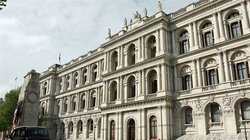 The British Council has been forced into the spotlight by the conviction in Iran of Aras Amiri on national security charges.
The British Council has been forced into the spotlight by the conviction in Iran of Aras Amiri on national security charges. RNA - Amiri, an Iranian national with British residency, was convicted in May of spying for the British intelligence services. She recently lost her final appeal against her 10-year jail sentence.
Based on media reports and official announcements by the Iranian judiciary, the case against Amiri revolved around her employment with the British Council and her lead role in organising the Council’s Iran-related activities.
The British Council can trace its roots to the “British Committee for Relations with Other Countries”, which was formed in 1934.
Thus, from the outset the Council was an integral part of British foreign policy formulation and implementation.
This foundational role has only intensified in recent years as the Council has established deep roots in over 100 countries, where it ostensibly undertakes a wide range of “cultural” and “educational” activities.
Founded as a charity governed by Royal Charter, the British Council is extensively supported by the Foreign and Commonwealth Office (FCO), a connection that it has never tried to hide.
The Council admits that 15 percent of its budget is provided by the FCO, whilst 85 percent of its turnover comes from “teaching”, “exams”, “tendered contracts” and “partnerships”.
From as far afield as Buenos Aires, to New Delhi and Hong Kong, the British Council maintains huge offices and runs extensive “programmes” whose aim is to improve Britain’s international profile and serve the UK’s core interests.
But is the British Council a “genuine” educational and cultural body? The Guardian – which is no enemy of the British Council – ran a features article on October 8, 2012 where it questioned the sincerity of the Council’s role and the utility of its products.
Entitled “The British Council: friend or foe?” the Guardian piece gave a platform to overseas-based British educators who had run into conflict with the British Council.
One educator told the Guardian: “Every company I know has concerns about the British Council ... It uses its monopoly position aggressively: if you don’t play ball, it can simply ignore you or decide to collaborate with someone else”.
Due to the nature of its work, and specifically its proximity to the FCO and by extension MI6, the British Council has run into difficulties with host governments.
In recent times, the most publicised case of the Council’s troubles was in Russia where it was ordered to close down its offices in December 2007.
The Russian Foreign Ministry claimed the Council had been working “illegally” in Russia. Most observers at the time interpreted the Russian move as a punitive action against the FCO and by extension MI6.
According to Press TV, the British Council has also been subject to physical attacks by insurgent groups and non-state actors who view the organisation as a barely concealed extension of British foreign policy.
The worst attack took place in Kabul (Afghanistan) in August 2011 when Afghan insurgents attacked and destroyed the British Council compound, killing 12 people in the process.
Additionally, in April 2013, Libyan militants tried to bomb the British Council compound in Tripoli.
In the final analysis, it does seem odd that an ostensibly “cultural” and “educational” organisation should incur the wrath of so many governments and non-state actors around the world.
847/940